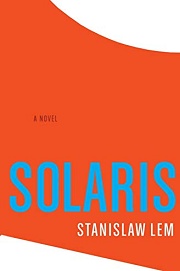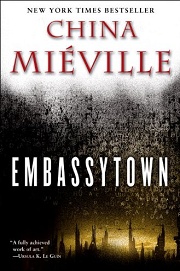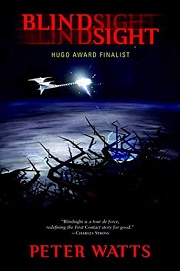Share your thoughts in a quick Shelf Talk!
Solaris by Stanisław Lem
Orbiting an enigmatic ocean world, scientists confront a living planet that reflects their deepest selves. Philosophical, eerie, and unforgettable, Solaris explores memory, grief, and the limits of understanding in a first-contact story that reshapes what it means to meet the alien.
Have you read this book? Share what you liked (or didn’t), and we’ll use your answers to recommend your next favorite read!
Love Solaris but not sure what to read next?
These picks are popular with readers who enjoyed this book. Complete a quick Shelf Talk to get recommendations made just for you! Warning: possible spoilers for Solaris below.
In Solaris, did you enjoy ...
... the philosophical probe into language, consciousness, and contact with an unknowable intelligence?
Embassytown by China Miéville
If what gripped you in Solaris was Kris Kelvin’s dawning realization that the ocean might be beyond human categories—despite years of monographs, experiments, and those desperate attempts to "communicate"—then Embassytown takes that fascination and makes it the whole engine. Avice Benner Cho watches human Ambassadors try to speak with the Ariekei, whose Language can only be spoken by paired minds and resists metaphor and lies. As with the "visitors" that manifest for Kelvin—Harey/Rheya most painfully—communication here isn’t just hard; it warps ethics, identity, and reality. You’ll feel the same intellectual vertigo you felt on the Solaris station when speech itself becomes the battleground.
... an encounter with an alien presence that feels fundamentally unknowable and indifferent?
Blindsight by Peter Watts
Remember how the ocean on Solaris mirrored the station crew’s minds yet never behaved like a person, making Kelvin, Snow, and Sartorius chase hypotheses that always slipped away? Blindsight follows a post-human crew led by Siri Keeton to investigate a structure called Rorschach, where the entities they meet—"Scramblers"—defy our assumptions about consciousness and intent. Like the futile x-ray bombardments and cataloging of "mimoids" and "asymmetriads" on Solaris, every experiment here yields answers that erode the very idea of what it means to think. It’s that same cold, exhilarating brush with an intelligence that may not be a mind in any human sense.
... the slow, scientific investigation of an enigmatic environment that rewrites human reality?
Annihilation by Jeff VanderMeer
If the measured, uneasy inquiry on the Solaris station drew you in—the logbooks, the autopsies of phenomena, the way Kelvin tries to treat Harey like a problem to be solved until that approach collapses—Annihilation delivers a similarly methodical dive into the unknown. An expedition’s biologist narrates the team’s foray into Area X, cataloging spores, topography, and the "Crawler" with a restraint that only heightens the dread. As in Solaris, rational protocols fray; personal grief seeps into field notes; and the terrain itself seems to study the investigators back.
... the eerie, surreal sense that contact has broken our categories and left us haunted?
Roadside Picnic by Arkady and Boris Strugatsky
If the surreal unease of Solaris lingers for you—the way the ocean’s "guests" turn memory into a living, destabilizing presence for Kelvin—then the Zone of Roadside Picnic will feel chillingly familiar. Stalker Redrick Schuhart guides illegal excursions through a landscape where physics misbehaves and artifacts defy explanation, much like the Solaris formations that tempt and punish human curiosity. The result is the same dreamlike disorientation you felt on the station: the world is recognizably ours, yet just skewed enough to undo certainty and leave an ache you can’t name.
... intimate, psychologically probing relationships that force impossible ethical choices?
Never Let Me Go by Kazuo Ishiguro
If what moved you in Solaris was Kelvin’s evolving bond with Harey—his guilt, tenderness, and the terrible ethics of deciding her fate—Never Let Me Go channels that same intimate, piercing psychology. Kathy, Ruth, and Tommy grow up together under a calm veneer that conceals a devastating purpose, and the story dwells in the quiet, everyday moments where love and duty collide. Like Kelvin’s final, ambiguous acceptance on the ocean’s surface, Ishiguro’s ending trades grand answers for a profound emotional reckoning.
Unlock your personalized book recommendations! Just take a quick Shelf Talk for Solaris by Stanisław Lem. It’s only a few questions and takes less than a minute.





